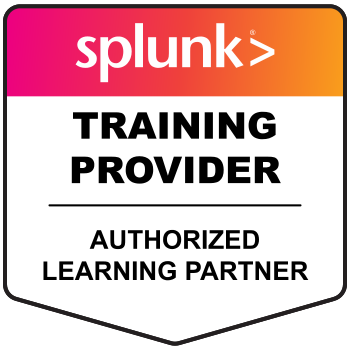Đào tạo chính hãng
Splunk
Splunk, together with Trainocate, is offering trainings to encompass the various technologies within Splunk. Its mantra is on getting an individual or corporation the quickest possible start on relevant practical information to ensure flexibility and reduce down-time to a minimum.
The trainings will focus on the Splunk platform, Enterprise Security, IT Operations and Observability.

Lọc theo
SPLK-VIZALRTINFRAMON - Visualizing and Alerting in Splunk Infrastructure Monitoring
This course assumes that you have completed the course Splunk Infrastructure Monitoring Fundamentals. It is targeted towards DevOps/SRE/Observability teams, Senior On-call Engineers, Onboarding and Monitoring Strategists and Developers. This 1-virtual day course describes ways to enhance your dashboards and alerts to help with troubleshooting. Find insights using analytics in charts and detectors. Create detectors for common use cases. All concepts are taught using lectures and scenario-based hands-on activities.
5.0 days
SPLK-APPPRFMMON - Using Splunk Application Performance Monitoring
This 1-virtual day course targeted to developers and DevOps enables you to use Splunk APM to analyze traces, troubleshoot and monitor your microservices-based applications. Through in-person discussions and hands-on activities, deep dive into uses of distributed tracing, navigating the Splunk APM app to analyze traces, visualize and alert on APM metrics.
All concepts and taught through discussions and hands-on activities.
5.0 days
SPLK-APPMETSPLKIM - Ingesting Application Metrics in Splunk IM
This 1-day virtual course, targeted towards developers and DevOps, focuses on creating custom metrics to monitor your applications/services with Splunk IM. Learn to instrument applications/services to send in custom metrics that characterize the application of service. Define relevant metadata for your metrics to let you find, filter and aggregate the metrics that you want to chart or alert on. Create charts and custom dashboards to visualize these custom metrics. Create detectors to monitor the metrics to alert when there are any issues with the application or service.
Learn the concepts and apply the knowledge through discussions and hands-on activities.
1.0 day
SPLK-TERRAPROSPLKIM - Using the Splunk IM Terraform Provider
This virtual 2-day course targeted towards DevOps, Observability and SRE teams is a follow-up to the course "Automation Using the REST and SignalFlow APIs". Learn to use the Splunk Terraform provider to manage Splunk IM resources for visualization, alerting and teams. Create and manage detectors and muting rules. Learn to create and modify teams including team notification policies.
All concepts are taught through discussions and hands-on lab exercises
2.0 days
SPLK-AUTORESTSFLO - Automation Using the REST and SignalFlow APIs
Splunk IM exposes a comprehensive API that allows you to automate any action that can be done using the User Interface. This 2-day virtual course provides the foundation for you to use the API to automate bulk actions such as the creation of charts, dashboards, and alerts. See how to programmatically perform computations that can be used in charts and detectors or streamed in real-time. Use the API to manage Splunk IMteams
Learn the concepts and apply the knowledge through discussions and hands-on activities.
2.0 days
SPLK-LOGOBS - Using the Splunk Log Observer
This course is designed for developers responsible for debugging their own applications, and for SREs responsible for troubleshooting performance issues. The Splunk Log Observer is built primarily for DevOps teams working on applications built on modern tech stacks (containerized micro-services). However, the course it can be taken by anyone who wants to view recent log data in a no-code environment. This 1-virtual-day course describes how to use the tool to work with log data using the no-code user interface. You will learn to create, save, and share search filters; and to investigate the shape of your log data. You will analyze logs with aggregation functions and group by rules. And you will create rules to manipulate incoming data, as well as to generate synthetic metrics from log data. All concepts are taught using lectures and scenario-based hands-on activities.
5.0 days
SPLK-MONKBSPLKIM - Kubernetes Monitoring Using Splunk IM
This 1-virtual day course is targeted to Site Reliability Engineers, DevOps Engineers, and Application Developers who deploy on and/or who manage Kubernetes clusters. This course teaches the skills you need to monitor and troubleshoot your Kubernetes infrastructure with Splunk. We teach how to track and alert on the status of your installation using built-in tools focused on Kubernetes. You will learn to introspect clusters from multiple perspectives and identify potential trouble-indicators. Through in-person discussions and hands-on activities learn multiple ways you can view and automate the monitoring of your clusters and running jobs.
5.0 days
SPLK-ADMONCALL - Splunk On-Call Administration
This course is targeted towards Splunk On-call admins responsible for setting up incident response with Splunk On-Call. This 1-virtual day course describes the tasks required to set up on-call teams, including defining schedules, on-call rotations and shifts. Learn to set-up and configure alerts and integrations. Create post-incident review reports, track response metrics and customize reports. Use advanced features such as the Rules engine for advanced customization and configure webhook integrations. All concepts are taught using lectures and scenario-based hands-on activities.
5.0 days



